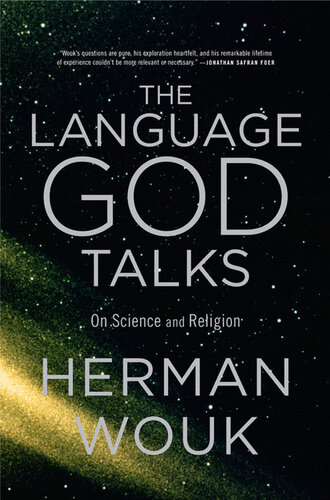
The Language God Talks
On Science and Religion
کتاب های مرتبط
- اطلاعات
- نقد و بررسی
- دیدگاه کاربران
نقد و بررسی

February 8, 2010
At age 94, Wouk embarks on an autobiographical journey through his monumental writings (The Caine Mutiny
; The Winds of War
; War and Remembrance
), people he has met in his life, world events, and books he has read (including the Talmud) to weave a testament of faith. Throughout the book, he returns to his friendship with Nobel laureateRichard Feynman, whose work as a scientist on the atomic bomb and life as a humanist challenge the author’s Orthodox Jewish beliefs. Along the way the reader meets other scientists and their accomplishments and also some of Wouk’s fictional characters. What most impresses Wouk is the big bang (“the first three minutes”) and the small bang (“the universe giving birth to the mind”) so that humans could comprehend God. Ever so faithful to his Jewish heritage, he discusses how research in the scientific and secular world strengthened his faith. This book will interest any person of faith who has followed Wouk’s storied career and read his fiction.

February 15, 2010
Pulitzer Prize–winning novelist Wouk (A Hole in Texas, 2004, etc.) tackles calculus, the Talmud and cranky, cantankerous physicists in a poignant examination of science and religion.
In a crowded book market filled with self-serving and redundant theories about humankind's place in the grand scheme, it is rare to encounter an original, honest, charming voice. Such is the case with Wouk's latest work. The author's journey began with an innocent but daunting challenge from the great Cal Tech physicist Richard Feynman, who, during one of their discussions of quantum mechanics, asked Wouk if he knew calculus. Wouk admitted that he did not."You had better learn it," Feynman replied."It's the language God talks." What followed was an earnest search to master said language in an effort to grapple with the all-to-human desire to better understand existence. During his search, Wouk discovered that God is in fact bilingual. His second language is one the author, and other mere mortals who flunked calculus, have more than a passing knowledge of—the language of faith. Be it Judaism, Christianity or any other religion, Wouk demonstrates that the divide between science and religion can be crossed, and one doesn't need a Nobel Prize to do it. However, there are no guarantees that you will find answers once you cross the chasm. To say that it's the journey and not the destination that matters would be to understate the profound respect and awe the author shows for all those engaged in the search for life's big answers, whichever language they speak. Wouk's humility, humor and insight make the book a joy to read and a wonder to contemplate. What the book lacks in pages, it makes up for in soul.
Authentic, accessible prose mixed with real insight.
(COPYRIGHT (2010) KIRKUS REVIEWS/NIELSEN BUSINESS MEDIA, INC. ALL RIGHTS RESERVED.)

March 15, 2010
Renowned physicist Richard Feynman set aside his Jewish faith in childhood. For him, the drama of humanity was just too small to fill such a vast cosmic stage. In this memoir of sorts, Pulitzer Prize-winning author Wouk ("The Caine Mutiny") takes his friend Feynman's critique of faith seriously, recounting Feynman's encounters with some of the last century's scientific luminaries and offering a running account of his own works and faith wanderings. Wouk freely admits he is a storyteller; the language of science is not his own. He believes in the power of lived religious observance both to give and to embody meaning, even after the Holocaust. In the end, Wouk appeals to a "counterculture" among scientists who find a place for cosmic meaning within science's grand narrative and offers background on his own writings in the process but no new insight on his topic. VERDICT This is an optional choice for those interested in the intersection of faith and science. Alan Lightman's "A Sense of the Mysterious: Science and the Human Spirit" covers much of the same ground with a similar personal touch. [See "Prepub Exploded," "BookSmack!", November 19, 2010.]Steve Young, McHenry Cty. Coll., Crystal Lake, IL
Copyright 2010 Library Journal, LLC Used with permission.

March 15, 2010
The first half of Wouks third book on religion (after This Is My God, 1959, and The Will to Live On, 1999) is as engaging as his megaselling historical novels. Its about his encounters with famous scientists, foremost among them physicist Richard Feynman, who suggested Wouk learn the language God talkscalculus. Wouk tried, unsuccessfully, but anyway kept on meeting and palavering with scientists, a habit acquired researching the atom bomb for The Winds of War (1971) and War and Remembrance (1978). His recounting of the science history he learned, predominantly about space exploration, is done so personably that stargazing laypersons ought to be tickled pink. He uses a little paleoanthropology and more WWII research to bridge from science to religion but then, unfortunately, bogs down abstracting the Battle of Leyte and Holocaust episodes in the war novels. He finishes well, though, with an imaginary dialogue with Feynman that winningly binds him and the physicist as Jews and affirms the continuing viability of questioning God. Hard not to like.(Reprinted with permission of Booklist, copyright 2010, American Library Association.)

























دیدگاه کاربران